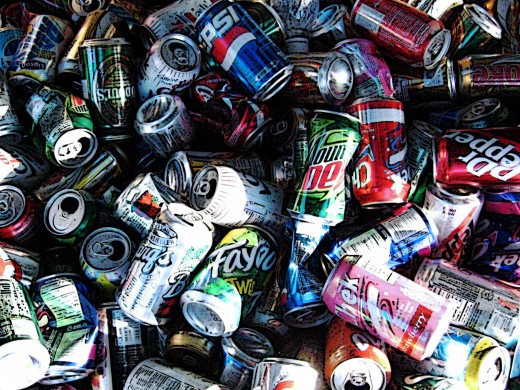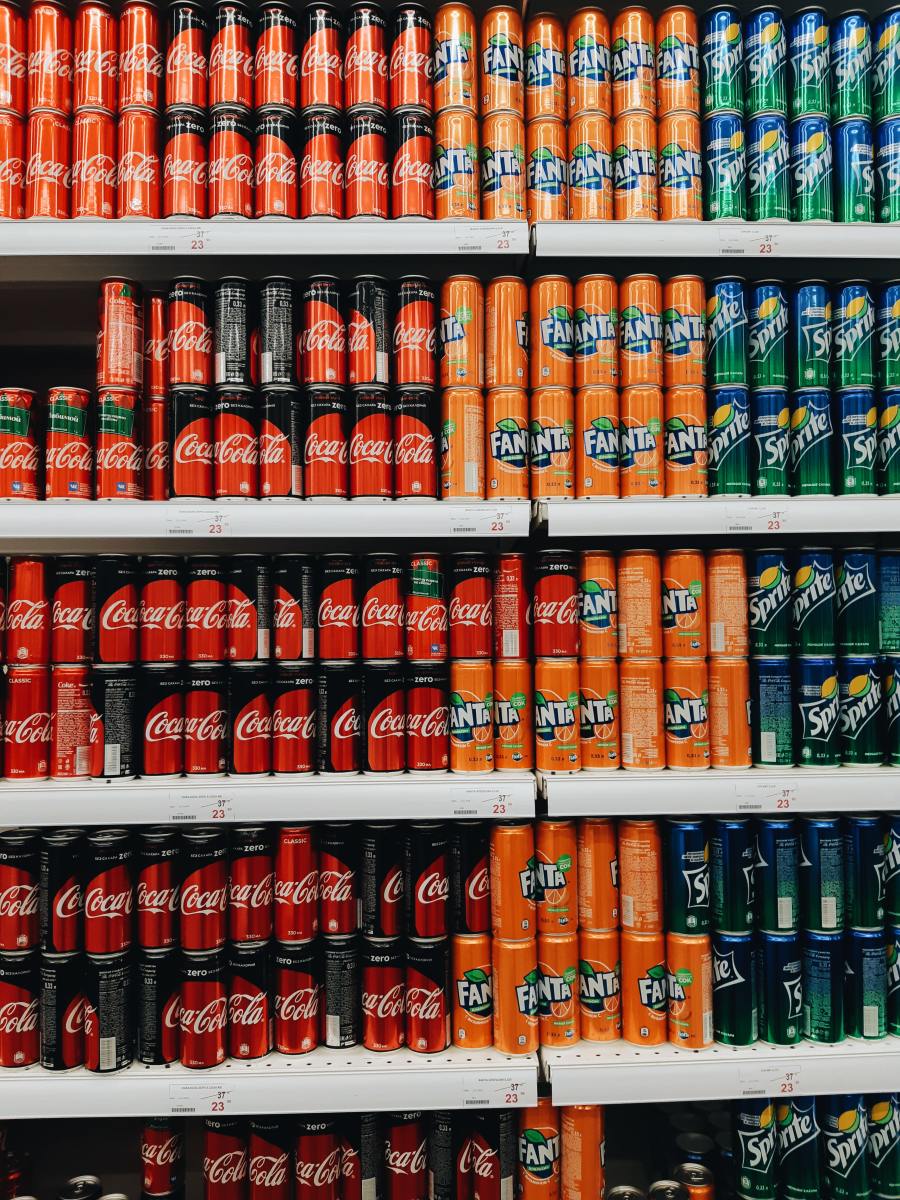Reducing Your Consumption: The Effects of Drinking One Less Soda Each Week

Americans used over 80,000,000,000 aluminum cans last year. That’s a rate of consumption of about 259.11 aluminum soft drink cans for each man, woman, and child per year or about 5 cans per person per week. If each person in America just reduced their consumption of this product by just 1 per week, it would save about 16,054,767,976 aluminum soda cans per year (roughly 20% of the annual total). What would happen if each person living in the USA reduced their consumption of aluminum cans by only 1 per week?
Energy Savings:
Not producing 16,054,767,976 aluminum cans saves around 530,920,570 lbs or 265,460 tons of aluminum each year! The energy saved by not having to produce those cans would be about 3,716,440 Mwh, or enough energy to power 337,858 average homes for a year. That's also equivalent to about 0.00219% of the total amount of energy produced in America annually.
Transportation Savings:
All those cans require trucks to transport them to the store. The average semi-truck has a maximum cargo weight limit of about 44,000 lbs (the truck and cargo must typically weigh no more than 80,000 lbs). This means that each truck can carry about 8,900 cans of soda. That's about 8,539,325 truck trips per year just delivering soda for our normal needs! If you used one less per week, it would save about 1,713,711 annual truck trips.
With an average delivery distance of about 170 miles per trip, the trucks would drive about 291,330,873 miles less in one year. Using one less soda can per week would reduce the amount of diesel fuel consumed by these trucks by about 41,618,696 gallons annually. This would also have the added benefit of reducing the wear and tear on our paved roads and highways.

Carbon Emissions Savings:
All the energy savings means that our carbon emissions would also be reduced. About 85% of our energy comes from CO2 producing sources, and America produces about 20,000 Twh of energy per year with a total CO2 emissions of 2,800,000,000 tons. This means that by using one less soda can per week, we could prevent 520,301 tons of CO2 emission from entering the atmosphere annually just from the power plants alone. If you factor in the reduction of carbon dioxide emissions from truck traffic, you would save an additional 461,967 tons. This equates to a total reduction in CO2 emissions of about 982,268 tons per year.
Water Savings:
The production of aluminum cans requires a substantial amount of clean water to accomplish. Due to all of the processes involved, each aluminum can needs about 10.6 gallons of water to produce and fill it. If each person reduced their consumption of aluminum soda cans by just 1 per week, it would save about 170,180,540,546 gallons of water annually! That's enough to supply every American with their typical water needs for about 5.5 days! Another way of looking at it is that it could supply Tulsa, Oklahoma with water for about 4.33 years!
Health Savings:
If Americans drank one less soda per week, there would be substantial health benefits. People reduce their caloric intake by about 1,204,107,598,200 calories each year (assuming that 50% of soft drinks sold are diet). This equivalent to a reduction in consumption of about 3900 calories (or 1.11 lbs of fat) per person per year. Not gaining 1.11 lbs of weight per year means that when an average 20 year old reaches retirement, they could have a weight of 50 lbs less than someone who drank the average number of 5 cans of soda per week. In total, America could lose 7,718,626 tons of excess body fat in 20 years if they just reduced their consumption of soda by 1 can per week!

Monetary Savings:
If each person used 52 less aluminum soda cans per year, it would save them approximately $13.00 per year. An average family would save about $34.00. If that family invested that money in a high yield savings account and made monthly deposits of $2.83, they could have roughly $1,255.00 in 20 years. That's enough to pay for books for a few semesters of college! In total, America could save themselves $4,013,691,994.00 annually or enough to fund the National Cancer Institutes Research Program for 2 years!
Let's not forget about the savings resulting from not having to transport all those cans to the stores. Since those truck wouldn't have to use 41,618,696 gallons of diesel fuel, it would save about $124,856,088.00 per year! That's enough money to fund the city of Sacramento for 56 days!
Conclusion:
If everyone used one less soda can per week, the results across America would be substantial. Even though I have made a few assumptions here to complete my analysis, there is no doubt in my mind how big of an impact something like this can have. It really puts things into perspective; every thing that we do has consequences no matter how small it seems.
References and Resources:
A Recycling Revolution. Recycling Facts. 2011. <http://www.recycling-revolution.com/recycling-facts.html>
AltEnToday. Home Energy Consumption. May 29th, 2008. <http://altentoday.com/2008/home-energy-consumption>
Association for a Greener Society. How Much Water is Consumed to Produce... March 25,2011. <http://greenermk.wordpress.com/2011/03/25/how-much-water-is-consumed-to-produce-%E2%80%A6/>
Center for Global Development. Carbon Dioxide Emissions from Power Plants Rated Worldwide. November 15, 2007. <http://www.sciencedaily.com/releases/2007/11/071114163448.htm>
City of Sacramento. Proposed Budget FY 11/12. April 11, 2011. <http://www.cityofsacramento.org/finance/budget/documents/FY12ProposedBudget-Web.pdf>
City of Tulsa. Tulsa's Drinking Water Facts. 2010. <http://www.cityoftulsa.org/city-services/water.aspx>
Florida Department of Transportation Office of Policy Planning. US Average Price of Diesel. March 2011. <http://www.floridatransportationindicators.org/detail.php?chart=16b>
Mississippi Department of Environmental Quality. Recycling Trivia. 2010. <http://www.deq.state.ms.us/mdeq.nsf/page/Recycling_RecyclingTrivia?OpenDocument>
Nebraska Public Power District. Electric Usage in Your Home. 2011. <http://www.nppd.com/My_Home/Product_Brochures/Additional_Files/electric_usage.asp>
Rare Cancer Alliance. Cost of Cancer. August 19, 2009. <http://www.rare-cancer.org/cost-of-cancer.php>
Storie, Matthew. 5 Ways to Increase Fuel Mileage on a Semi Truck. 2011. <http://mileage.mikes-musings.net/?p=70>
Tipler, Paul, A., Physics for Scientists and Engineers, Parts 39. Fourth Edition. Page 17. 1999.
U.S. Census Bureau. U.S. Census Bureau Announces 2010 Census Population Counts. December 21, 2010. <http://2010.census.gov/news/releases/operations/cb10-cn93.html>
U.S. Energy Information Administration. How Much Electricity Does An American Home Use? June 1, 2011. <http://www.eia.gov/tools/faqs/faq.cfm?id=97&t=3>
U.S. Energy Information Administration. U.S. Energy Facts Explained. 2011 <http://www.eia.gov/energyexplained/index.cfm?page=us_energy_home>
U.S. Environmental Protection Agency. Emission Facts: Average Carbon Dioxide Emissions Resulting from Gasoline and Diesel Fuel. April 12, 2011. <http://www.y12sweis.com/draftrefpdfs/RM%20273%20-%20EPA%202009.pdf>
U.S. Environmental Protection Agency. Water Sense. 2011. <http://www.epa.gov/WaterSense/pubs/indoor.html>
Waste Online. Metals - Aluminum and Steel Recycling. September 2005 <http://dl.dropbox.com/u/21130258/resources/InformationSheets/metals.htm>
Wiki Answers. How Much Does a Can of Soda Pop Weigh? 2011. <http://wiki.answers.com/Q/How_much_does_a_can_of_soda_pop_weight>
Wiki Answers. How Much Does an Empty Soda Can Weigh? May 20, 2010. <http://wiki.answers.com/Q/How_much_does_an_empty_aluminum_can_weigh>
Wikipedia. Energy In the United States. July 2011. <http://en.wikipedia.org/wiki/Energy_in_the_United_States>
Yahoo Answers. What is the Mass of a Soda Can in Grams? 2008. <http://answers.yahoo.com/question/index?qid=20080917153624AARAvW2>
© 2011 Christopher Wanamaker








